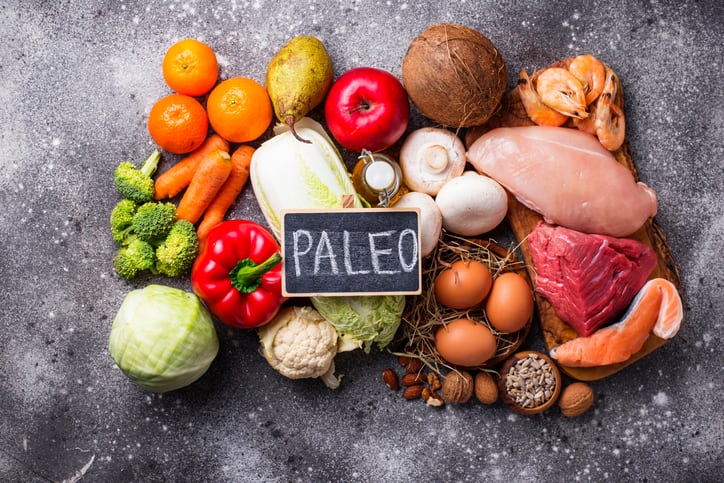The peer-reviewed study, published in Nutrients, was a large-scale meta-analysis. Researchers looked at 4,008 previously published studies to compare the health impacts of many of the most popular diets. These included: the Mediterranean diet; the Paleo diet; the DASH diet (one rich in vegetables, fruits and whole grains); a plant-based diet; a dietary guidelines diet (diets based on a variety of current government recommendations); a low-carbohydrate, high-fat diet (e.g., ketogenic diet); and a ‘typical’ Western diet.
The researchers wrote that the Mediterranean diet was likely “the most effective dietary pattern in lipid profile improvement, a low carbohydrate high-fat diet may be beneficial for glycaemic control, and the Paleo diet appeared best for reducing inflammation”.
No dietary pattern performed consistently best across all major NCD biomarkers or categories, although overall the paleo diet, DASH diet, and Mediterranean diet had the highest ratings.
“The majority of the confidence of evidence ratings were low, indicating more research is needed including high-quality randomised trials with clinical outcomes to determine whether the Paleo diet indeed has a role in NCD prevention,” the authors added. “Furthermore, our findings were predominantly independent of macronutrient composition, highlighting the potential importance and significance of evidence and advice at the dietary pattern-level.”
Merging all the scores, the paleo diet (which includes fruits, vegetables, lean meats, fish, eggs, nuts and seeds and avoids grains, legumes and dairy products) was the healthiest diet with an overall SUCRA (a numeric presentation of the overall ranking) score of 67%, DASH at 62%, and Mediterranean at 57%. The Western diet ranked worst at 36%.
The study was welcomed by Trevor Connor, CEO of The Paleo Diet, an organisation that aims to provide guidance for the food industry by codifying paleo diet standards and making them available to manufacturers, retailers and other partners.
“It is important because it was a large-scale meta-analysis, often considered the gold standard for generating scientific consensus, and because it shows how much the scientific body of evidence supporting The Paleo Diet has grown over the past 20 years,” he said. “These science-backed results contradict popular online diet rankings and common recommendations by dietitians, warranting a revaluation of The Paleo Diet and its place in the practice of healthy nutrition.”
The paleo diet has been unfairly lumped into the “fad diet” category owing to a lack of randomized clinical trials backing it, he added. “This felt like unfair criticism at the time because there simply had not been enough time to conduct those studies…
"This latest study illustrates how the science contradicts the media, backing The Paleo Diet as healthier than the Mediterranean and DASH diets, which are two of the diets most often recommended by dietitians.”
Separate trial finds fasting lacking in beneficial health effects
Another diet put in the “fad” category is intermittent fasting. Intermittent fasting, such as the 5:2 diet has surged in popularity in recent years as a way to lose weight and improve health.
However, new research published in the journal Aging Biology has found while diets involving intermittent fasting could potentially help people lose weight, they lack the beneficial health effects of other forms of weight loss such as improved insulin resistance and reduced inflammation.
“There have been a lot of claims that these diets are associated with other benefits alongside weight loss, including increased health and longevity,” said Professor Fontana, the Leonard P. Ullman Chair in Translational Metabolic Health at the University of Sydney's Charles Perkins Centre and Faculty of Medicine and Health.
“Our randomised clinical trial was designed to test these claims by measuring the effects of intermittent fasting-induced weight loss on inflammatory, metabolic, and molecular pathways of healthy aging.”
The clinical trial involved 50 participants aged 30 to 65 placed into an intermittent fasting group and a control group who consumed their usual diet. After six months, blood samples were taken to measure and compare markers of ageing and inflammation before and after weight loss.
The results of clinical trials showed that many of the health benefits claimed by intermittent fasting either lack data to back them or were significantly lower than expected.
“This study shows that, unlike with chronic daily calorie restriction with optimal nutrition, a similar eight percent weight loss induced by intermittent fasting does not reduce markers of inflammation, such as C-reactive protein or any other circulating inflammatory cytokine. We also found that intermittent fasting caused a statistically significant but very small improvement in some insulin sensitivity indexes.
“This is consistent with the results of recent randomised trials of alternate-day fasting showing no improvements in either markers of inflammation or insulin sensitivity.”
Not all calories are the same
This study adds to an emerging concept that, from a metabolic point of view, not all calories are the same or have the same effect on the body, said Professor Fontana.
“In contrast to intermittent fasting, calorie restriction with optimal nutrition and exercise training have a massive beneficial effect on insulin sensitivity and glucose tolerance.”
This means that people looking to experience the full benefits of weight loss, such as a lowered risk of cardiovascular disease, diabetes or inflammation, should consider the nutrient balance of their diet and not just the calorie content.
“While intermittent fasting clearly is a powerful instrument to lose weight, the quality of diet during non-fasting days and the amount of exercise people get are crucial factors in maintaining or improving health and wellbeing,” said Professor Fontana.
“If you want to experience the full benefits of weight loss, it’s not just about the quantities of calories you ingest or when, but what nutrients they come with.”
Reference
Dietary Patterns and Non-Communicable Disease Biomarkers: A Network Meta-Analysis and Nutritional Geometry Approach
Nutrients
DOI: https://doi.org/10.3390/nu15010076
When a calorie is not a calorie: metabolic and molecular effects of intermittent fasting in humans; exploratory outcomes of a randomized clinical trial
https://agingcelljournal.org/Current_Volume/article1/Intermittent_Fasting_Manuscript_Nov_28_2022.html
Hear more about specialist diets and how the latest nutritional science and technology can meet evolving consumer demands at FoodNavigator's inaugural face-to-face Positive Nutrition Summit: Healthy Innovation for the Mass Market on 29-31 March in central London.
Our full list of speakers can be found here, and the advance programme is available here.
For more information or to register, click HERE.






